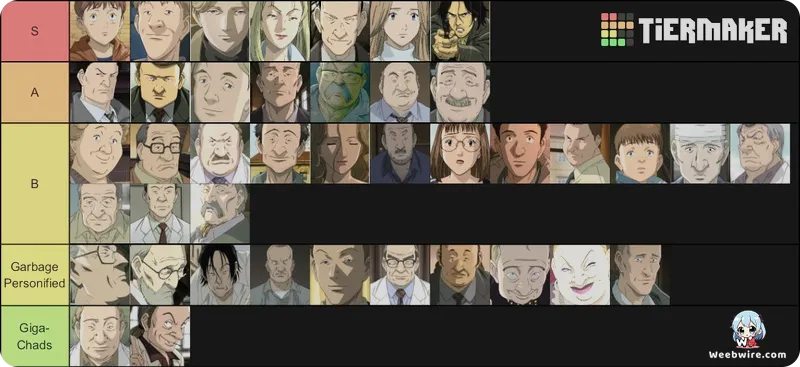Unmasking the Genius: Why Naoki Urasawa's 'Monster' Remains a Psychological Thriller Masterpiece

Naoki Urasawa's Monster, a profound psychological thriller, first captivated audiences as a manga before its masterful anime adaptation by MADHOUSE in 2004. This critically acclaimed series transcends typical genre boundaries, offering an unsettling exploration into the depths of human nature and the insidious presence of evil. The narrative centers on Dr. Kenzo Tenma, a brilliant Japanese neurosurgeon based in Düsseldorf, Germany, whose life irrevocably shifts when he prioritizes saving a young boy, Johan Liebert, over the city's mayor. This fateful decision propels Tenma into a decade-long odyssey of pursuit and moral reckoning, as Johan evolves into a charismatic yet terrifying 'monster' orchestrating a chilling series of murders across Europe.
The Power of Realism: Urasawa's Meticulous Research
What sets Monster apart is Naoki Urasawa's unparalleled commitment to realism, a hallmark of his distinguished career. Before and during the manga's serialization, Urasawa embarked on extensive travels throughout Germany and Eastern Europe. This meticulous research allowed him to absorb the cultural nuances, architectural details, and historical complexities, particularly concerning the Cold War's aftermath and German reunification, imbuing his narrative with an extraordinary sense of authenticity. Every meticulously rendered street, every historically resonant backdrop, and every subtly woven political undertone contribute to a chillingly plausible reality, grounding the series' psychological dread in tangible locations.
MADHOUSE's Unwavering Fidelity
The anime adaptation, helmed by MADHOUSE, is lauded for its unwavering fidelity to Urasawa's original vision. Eschewing common adaptation pitfalls, the series maintains the manga's deliberate, methodical pacing, allowing the intricate plot to unfold organically and the psychological tension to build with a slow-burn intensity. This commitment to the source material is paramount to its enduring appeal, preserving the essence of Monster: its quiet horror, its profound philosophical inquiries, and its deeply complex character studies. MADHOUSE masterfully translates Urasawa's distinctive art style, known for its realistic character designs and expressive faces, which are crucial for conveying the nuanced emotions and internal struggles of characters like Tenma's moral anguish and Johan's unsettling composure.
Subverting Expectations: The Human Monster
A fascinating aspect of Monster is its masterful subversion of traditional thriller tropes. Here, the 'monster' is not a supernatural entity or part of a grand conspiracy in the conventional sense. Instead, Johan Liebert embodies a purely human evil, a chilling product of trauma, ideology, and circumstance. His nihilistic philosophy, which questions the very value of human life and identity, makes him one of anime's most disturbing antagonists, precisely because his depravity is so disturbingly relatable. Johan's unsettling ability to manipulate and charm, coupled with his profound emptiness, serves as a terrifying reflection of humanity's darker impulses. Conversely, Tenma represents an unwavering belief in the sanctity of life, his moral compass guiding him through increasingly ambiguous situations. This constant philosophical interplay between Tenma's idealism and Johan's nihilism forms the intellectual core of the series.

A Tapestry of Characters
Furthermore, the series boasts an expansive cast of supporting characters, each meticulously fleshed out and integral to the narrative's rich tapestry. From the determined BKA Inspector Lunge, whose rigid logical deductions often lead him astray, to the reformed criminal Grimmer, whose tragic backstory and unwavering kindness provide moments of profound poignancy, every individual serves a purpose in exploring the multifaceted nature of good and evil, justice, and identity. Urasawa's genius lies in making these characters feel profoundly real, their motivations understandable, even when their actions are reprehensible. This depth of characterization is a hallmark of Monster and significantly contributes to its immersive quality.
The Unsung Hero: Kuniaki Haishima's Soundtrack
The anime's soundtrack, composed by Kuniaki Haishima, is an unsung hero, expertly employing minimalist compositions, eerie silence, and melancholic melodies to amplify the psychological tension and pervasive sense of dread. The opening theme, "Grain," with its haunting visuals and sparse instrumentation, perfectly sets the tone for the complex and often disturbing journey ahead. The music never overpowers the narrative; instead, it subtly enhances the atmosphere, making quiet moments even more unsettling and revelations more impactful. This nuanced approach to sound design is a testament to the production team's deep understanding of the source material's delicate balance.
An Enduring Legacy: The Ambiguous Conclusion
Finally, Monster's ending, while offering a degree of resolution, deliberately leaves certain questions open to interpretation, sparking extensive fan discussions for years after its conclusion. This inherent ambiguity is intentional, prompting viewers to ponder the nature of identity, the lingering effects of trauma, and the cyclical nature of human evil. It doesn't offer easy answers but rather encourages deep reflection, solidifying its status as a thought-provoking masterpiece. The enduring legacy of Monster lies not just in its thrilling mystery but in its unflinching examination of the human condition, making it a timeless work that continues to resonate with new audiences and stand as a pinnacle of the psychological thriller genre. Its careful pacing, deep character studies, and philosophical underpinnings solidify its place as a truly unique and unforgettable anime experience.
Credits
Monster
Author
Naoki Urasawa
Cover Art
Naoki Urasawa
Studio
MADHOUSE
Publisher
Shogakukan





